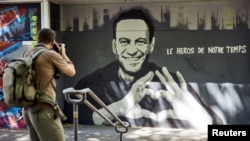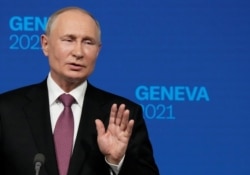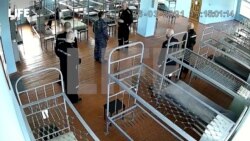Russian President Vladimir Putin said Wednesday that jailed opposition leader Alexey Navalny got what he deserved when he was sentenced to prison.
Putin, speaking at a news conference in Geneva after his summit with U.S. President Joe Biden, said, without mentioning Navalny's name, "He deliberately moved [back to Russia] to be arrested."
Navalny, Putin's most prominent political foe, was arrested in January when he returned from Germany, where he had been treated at a Berlin hospital for five months while recovering from a poisoning. Navalny contends Russian agents applied the nerve agent Novichok to his underwear in August, a claim Moscow has denied.
Then, in February, Navalny was handed a two-and-a-half-year prison term for violating terms of a suspended sentence he had been given after a 2014 embezzlement conviction he has claimed is politically motivated.
Putin told reporters that Navalny had received his due punishment for violating his probation and had known he would be arrested when he returned to Russia.
When asked what would happen if Navalny died in prison, Biden said Wednesday, "I made it clear to him that I believe the consequences of that would be devastating for Russia."
In an interview last week with NBC News, Putin denied ordering the poisoning of Navalny.
"We don't have this kind of habit of assassinating anybody," Putin said, but he would not guarantee that Navalny would get out of prison alive.
"Look, such decisions in this country are not made by the president," Putin said. "He will not be treated any worse than anybody else."
A Moscow court last week outlawed organizations founded by Navalny, describing them as "extremist." Analysts viewed the move as part of Putin's effort to silence dissent and bar Kremlin critics from running for parliament in September.
In the NBC interview and at Wednesday's news conference, Putin equated Russia's response to dissent with the arrest of more than 500 supporters of former U.S. President Donald Trump during the January 6 attack on the U.S. Capitol. Putin contended the U.S. arrests had infringed on the protesters' rights to free speech, ignoring the fact that some of the protesters were charged with injuring dozens of police officers, smashing windows and ransacking congressional offices.
"We sympathize with what happened in the United States," he said in Geneva. "We have no desire to allow the same thing to happen in our country."
At a rally shortly before the assault on the Capitol, Trump urged his supporters to "fight like hell" in confronting lawmakers as they were certifying Biden's Electoral College victory in November's election.
But Putin claimed they had been charged with criminal offenses only because they made "political demands."
"Isn't that persecution for political opinions?" Putin asked.
Only a handful of the cases have been adjudicated so far. Those convicted of violence or vandalism in the attack on the Capitol could face years in prison, while those who only entered the building against restrictions could be handed light sentences or given probation.






